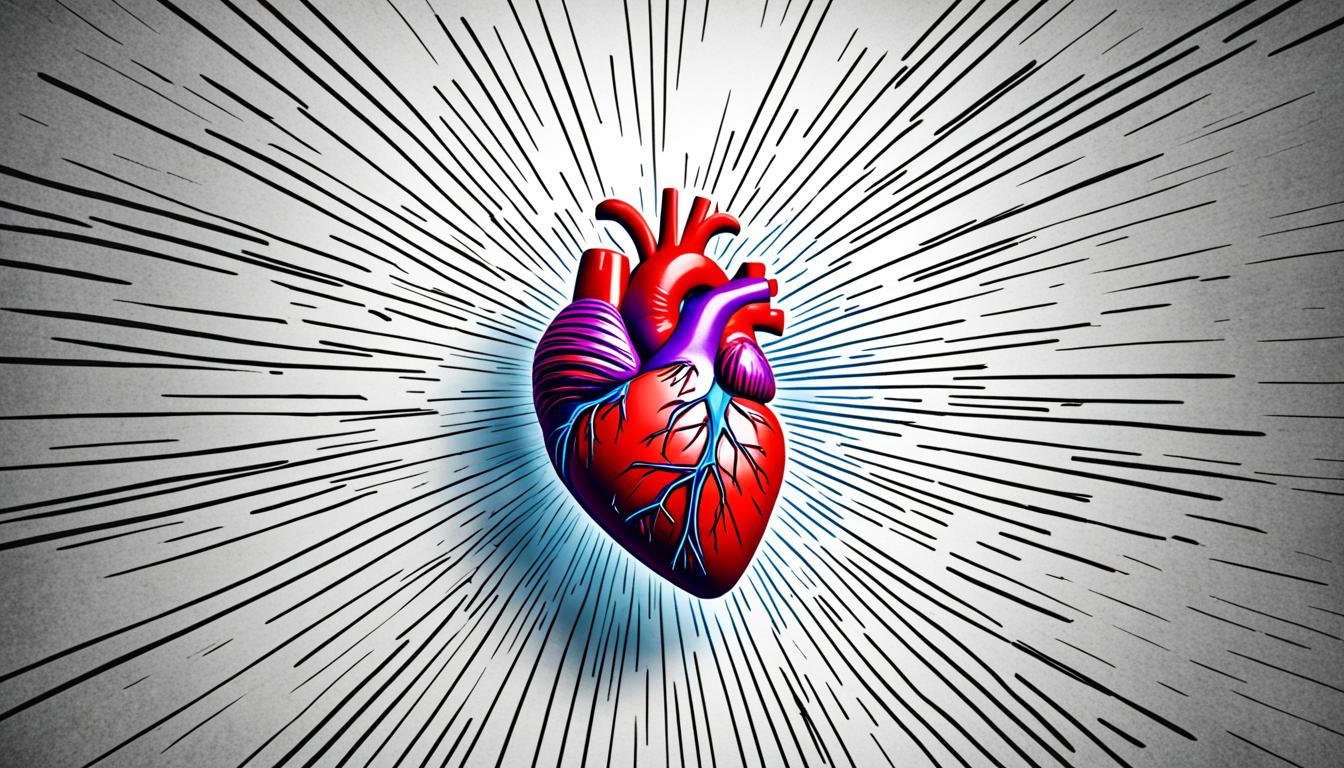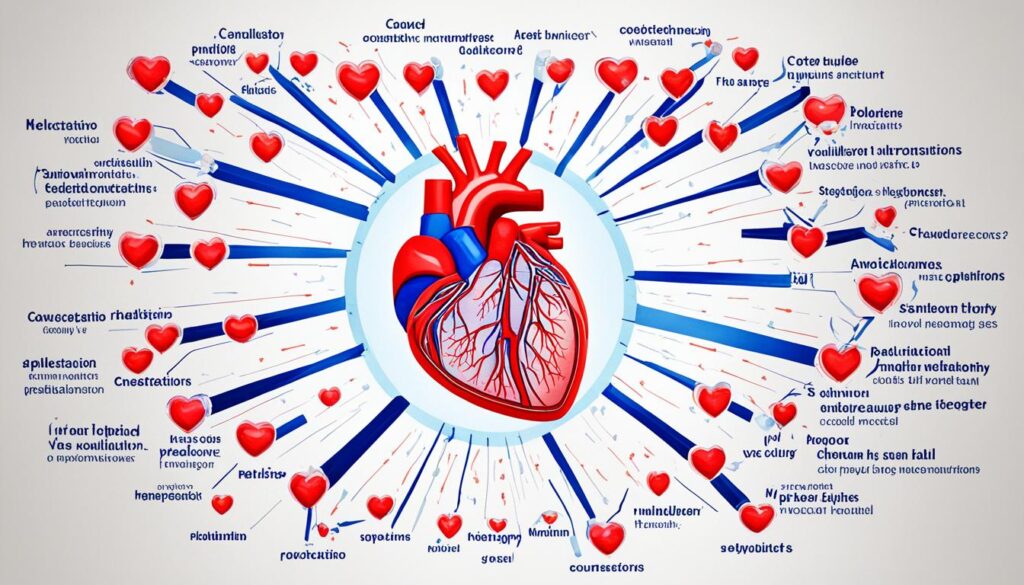
Heart Palpitations: Causes and Treatment Methods
Have you ever felt your heart racing, fluttering, or pounding in your chest? These feelings, known as heart palpitations, can be scary. But, are they always something to worry about? Knowing what causes them and how to treat them can help you handle this common health issue better. So, what are heart palpitations, and when should you get medical help?
Key Takeaways
- Heart palpitations are feelings of a fast, fluttering, or pounding heartbeat. They can be caused by stress, exercise, or certain medications or medical conditions.
- While palpitations are often harmless, they can sometimes be a sign of a serious heart issue. This might mean you need treatment.
- Common causes of heart palpitations include anxiety, pregnancy, caffeine, alcohol, and certain medications or drugs.
- Palpitations can feel like the heart is beating too fast, flip-flopping, fluttering rapidly, pounding, or skipping beats. You might feel this in the throat, neck, or chest.
- If you have severe shortness of breath, chest pain, or fainting with palpitations, get medical help. Also, seek help if they keep happening or get worse over time.
What Are Heart Palpitations?
Symptoms and Characteristics
Heart palpitations make you feel like your heart is racing or pounding. You might feel this in your chest, throat, or neck. It can happen when you’re active or just sitting still. Most of the time, these feelings are not serious. But sometimes, they could mean there’s a bigger issue with your heart.
When you have heart palpitation symptoms, you might notice your heart beating fast or irregularly. You might feel a flutter in your chest or a pounding feeling. These feelings can be strong and might affect how you go about your day. The way people describe these palpitations varies. Some say it feels like their heart is racing fast, while others feel a strong pounding.
Not all heart palpitations are something to worry about. Many people get them, especially when they’re stressed or anxious. But if you keep getting them, or if they come with other symptoms like chest pain or feeling dizzy, you should see a doctor. They can check what’s going on and help you figure out what to do next.
“Heart palpitations can feel like your heart is racing, fluttering, or even skipping a beat. While they can be worrying, most of the time, they’re not a sign of a serious heart problem.”
Common Causes of Heart Palpitations
Heart palpitations make you feel like your heart is beating irregularly. They can be caused by many things. Here are some common reasons:
- Strong emotional responses like stress and anxiety – Feeling very worried, scared, or panicked can make your heart feel like it’s skipping beats.
- Strenuous exercise – Working out hard can make your heart beat faster and cause palpitations, especially if you have heart problems.
- Stimulants like caffeine and nicotine – Drinks and foods that speed up your heart can make palpitations worse.
- Certain medications and drugs – Some medicines and drugs, like cocaine and methamphetamine, can cause heart palpitations.
- Hormonal changes – Changes in hormones during menstruation, pregnancy, or menopause can lead to heart palpitations.
- Fever – Having a high temperature can make your heart beat faster and cause palpitations.
Sometimes, heart palpitations can be a sign of a serious heart problem, like an irregular heart rhythm (arrhythmia). If palpitations don’t go away or get worse, you should see a doctor. They can check if you have a health issue.
| Cause | Description |
|---|---|
| Stress and Anxiety | Feeling very stressed or anxious can make your heart feel like it’s skipping beats. |
| Exercise | Working out hard can make your heart beat faster, especially if you have heart problems. |
| Caffeine and Nicotine | Drinks and foods that speed up your heart can make palpitations worse. |
| Medications and Drugs | Some medicines and drugs can cause palpitations as a side effect. |
| Hormonal Changes | Changes in hormones during menstruation, pregnancy, or menopause can lead to heart palpitations. |
| Fever | Having a high temperature can make your heart beat faster and cause palpitations. |
| Arrhythmia | Persistent or worsening palpitations may be a symptom of an irregular heart rhythm. |
If you keep having heart palpitations, you should see a doctor. They can find out why and help you.
Anxiety and Stress-Related Palpitations
Heart palpitations often come from anxiety and stress. When you feel anxious or stressed, your body reacts by releasing hormones like adrenaline. This can make your heart race and cause palpitations. In the U.S., 19.1% of adults have anxiety disorders, which can lead to this issue.
Managing Anxiety and Stress
To deal with anxiety and stress-related palpitations, try relaxation techniques. Meditation, yoga, and deep breathing exercises are good options. They help calm your mind and body, easing symptoms like palpitations.
Also, avoid stimulants like caffeine and nicotine, as they can make palpitations worse. Keeping a healthy lifestyle, including regular exercise and a balanced diet, can also help manage anxiety and stress. If palpitations don’t go away or get worse, see a doctor to check for other health issues.
“Anxiety causes heart palpitations, which can be a symptom of anxiety and not a major cause for concern as long as the person is aware of triggers and the palpitations cease when anxiety lessens.”
Using these relaxation techniques and making lifestyle changes can help you manage anxiety and stress-related palpitations. This keeps your heart healthy and balanced.
Lifestyle Factors Contributing to Palpitations
Heart palpitations can come from many lifestyle choices. Things like caffeine, nicotine, and some medicines can cause them. Drinking too much alcohol is also linked to heart rhythm problems. Plus, hard exercise can lead to palpitations, especially for those with heart issues.
It’s key to watch these lifestyle habits and make changes to lessen palpitations. Keep an eye on how much stimulants you use, handle stress well, and stick to moderate exercise. These steps can help keep your heart rhythm steady.
- Limit caffeine and nicotine intake
- Avoid excessive alcohol consumption
- Practice stress management techniques
- Engage in regular, moderate exercise
By focusing on these lifestyle changes, you can lessen palpitations and keep your heart healthier.
“Addressing lifestyle factors can be an effective way to manage and reduce the occurrence of heart palpitations.”
Causes of heart palpitations and some methods of treating heart palpitations
Heart palpitations can be worrying, but they’re quite common. They can stem from many things, both harmless and serious. Knowing the causes of heart palpitations and how to treat them can help you manage them better.
Some common causes of heart palpitations include:
- Stress and anxiety – Feeling stressed can set off the fight-or-flight response, making your heart race.
- Stimulants – Things like caffeine, nicotine, some medicines, and drugs can make your heart skip beats.
- Medical conditions – Issues like arrhythmias, thyroid problems, anemia, and COVID-19 can cause heart palpitations.
- Lifestyle factors – Not getting enough sleep, not drinking enough water, and eating poorly can also lead to palpitations.
When treating heart palpitations, finding and fixing the root cause is key. This might mean:
- Making changes in your life, like cutting down on stress, caffeine, and alcohol, eating well, and exercising regularly.
- Changing your meds if they’re causing the problem.
- Treating any health issues, like arrhythmias or thyroid problems.
- In some cases, you might need procedures like radiofrequency ablation or devices to help with severe palpitations.
Working with your doctor is crucial to find the best way to handle managing palpitations and palpitations remedies. With the right plan, you can improve your heart health and reduce the effect of palpitations on your life.
Medical Conditions Linked to Palpitations
Heart palpitations can sometimes be a sign of a serious health issue, not just stress or lifestyle. Some arrhythmias, like atrial fibrillation, make the heart’s upper chambers quiver. Structural heart problems, such as congenital defects or valve issues, can also cause palpitations.
Arrhythmias and Structural Heart Problems
A study found that 67% of people with mental health issues had an arrhythmia. Palpitations are common, especially in those with heart disease. A fast, regular heartbeat might be from supraventricular or ventricular tachycardias. A fast, irregular heartbeat could mean atrial fibrillation or flutter.
If you have palpitations with chest pain, fainting, or severe shortness of breath, get help right away. A full check-up, including heart sounds and limb checks, is key to figuring out what’s causing the palpitations.
| Condition | Prevalence | Symptoms |
|---|---|---|
| Atrial Fibrillation | 16% of patients presented with palpitations | Rapid, irregular heartbeat |
| Supraventricular Tachycardia | 43% of palpitations had a cardiac etiology | Rapid, regular heartbeat |
| Ventricular Tachycardia | 43% of palpitations had a cardiac etiology | Rapid, regular heartbeat |
| Structural Heart Defects | Palpitations are common in those with structural heart disease | Varied, depending on the specific defect |
Knowing about the medical conditions linked to palpitations helps people know when to get help. It also helps them work with their doctors to manage their symptoms better.
Diagnostic Tests for Heart Palpitations
If you keep feeling heart palpitations, your doctor might order tests to find out why. These tests are key to understanding your heart’s health and figuring out the best treatment.
The first test is often an electrocardiogram (ECG or EKG). It checks your heart’s electrical activity. This test can show if your heart is beating too fast, too slow, or not regularly. If the ECG doesn’t catch the palpitations, you might need to wear a Holter monitor for 24 to 48 hours. This device records your heart’s rhythm over a longer time.
Then, there’s the event recorder. You turn it on when you feel the palpitations. This lets your doctor look at your heart’s activity during those moments. An echocardiogram uses ultrasound to check your heart’s structure and how well it works. This test gives important clues about any possible issues.
| Test | Purpose |
|---|---|
| Electrocardiogram (ECG/EKG) | Measures the electrical activity of the heart to detect irregular rhythms |
| Holter Monitor | Continuously records the heart’s rhythm over 24-48 hours |
| Event Recorder | Captures heart activity during specific palpitation episodes |
| Echocardiogram | Uses ultrasound to assess the heart’s structure and function |
After the first tests, your doctor might suggest more tests. These could include stress tests, blood tests, or imaging scans. They help diagnose the cause of your palpitations and create the best treatment plan.
Treating Heart Palpitations
If you’re dealing with ongoing heart palpitations, it’s key to work with your healthcare provider. They will help figure out what’s causing it and create a treatment plan. The right treatment depends on the condition causing the symptoms.
Medications and Procedures
If your palpitations come from a heart issue, like an arrhythmia, your doctor might suggest medications. These could be beta-blockers, calcium channel blockers, or antiarrhythmic drugs. Sometimes, you might need procedures like cardioversion or ablation to fix the problem.
Cardioversion uses electrical shocks or drugs to bring your heart back to a normal rhythm. Ablation is a less invasive method that targets and destroys heart tissue causing the rhythm problems with heat or cold.
For palpitations caused by things like stress or stimulants, the goal is to tackle the source. Your doctor might suggest ways to manage stress, cut down on caffeine or alcohol, or avoid certain meds or supplements.
| Medication for Palpitations | Medical Procedures for Palpitations |
|---|---|
|
|
The right treatment for your heart palpitations will depend on the cause and how severe your symptoms are. By working with your healthcare provider, you can find the best way to manage your palpitations and keep your heart healthy.
Self-Care Strategies for Palpitations
Managing heart palpitations at home can help reduce their frequency and ease the discomfort. By using self-care strategies, you can play a big part in managing your palpitations. This can also boost your heart health.
Practicing stress-reducing activities is a key self-care method for palpitations. Meditation, yoga, and deep breathing exercises calm the mind and body. This can lower stress and anxiety, which often cause palpitations. Also, avoiding caffeine and nicotine helps, as they can make palpitations worse.
Living a healthy life is also crucial for managing palpitations. Regular exercise and a balanced diet are important. Exercise strengthens the heart and lowers palpitation risk. Also, getting enough electrolytes, like magnesium and potassium, helps balance your body and reduces palpitations.
| Self-Care Strategy | Potential Benefits |
|---|---|
| Meditation and Yoga | Reduces stress and anxiety, which can trigger palpitations |
| Deep Breathing Exercises | Helps to calm the body and regulate the sympathetic nervous system |
| Avoiding Stimulants (Caffeine, Nicotine) | Eliminates substances that can exacerbate palpitations |
| Regular Exercise | Strengthens the cardiovascular system and reduces palpitation risk |
| Balanced Diet | Ensures proper electrolyte balance to support heart function |
Using these self-care tips can help you manage and lessen heart palpitations. Always talk to your doctor if your palpitations don’t go away or seem strange. They might need medical help.
“Taking control of your palpitations through self-care can make a significant difference in your overall well-being.”
When to Seek Emergency Care
Most cases of heart palpitations are not emergencies and can be handled at home. But, you should get help right away if you have severe symptoms like chest pain, fainting, or severe shortness of breath. These signs could mean a serious heart issue that needs quick attention.
If you notice any of these, call 911 or head to the emergency room fast:
- Heart palpitations that last a few minutes or more
- New or getting worse symptoms, like chest pain, neck or arm aches, shortness of breath, sweating, dizziness, or feeling lightheaded
- Fainting or losing consciousness
Going to the hospital by yourself with heart symptoms can be risky. It’s safer to call for an ambulance. At the emergency room, doctors will run tests like an electrocardiogram (EKG), Holter monitor, and others to figure out why you have heart palpitations.
If your palpitations happen often, bother you, or come with other worrying signs, see a doctor. Getting medical help quickly can spot and treat any problems early, preventing worse issues.
“Don’t wait to seek help if you’re experiencing severe or concerning heart palpitations. Your health and safety should be the top priority.”
Preventing Future Palpitation Episodes
To prevent future heart palpitations, it’s key to find and fix the causes. By making changes in your life and health, you can cut down on these heart rhythm issues.
Stress and Anxiety Management
Stress and anxiety often lead to heart palpitations. Using stress-lowering methods like meditation, deep breathing, or yoga can soothe your mind and body. This helps stop palpitations caused by stress.
Dietary and Lifestyle Modifications
- Reduce stimulants like caffeine, nicotine, and alcohol to avoid making palpitations worse.
- Eat a balanced diet full of fresh fruits, veggies, lean meats, and whole grains for good nutrients and electrolytes.
- Stay active with exercise to strengthen your heart and boost your heart health.
Managing Underlying Conditions
Some health issues, like thyroid problems, anemia, or arrhythmias, can cause heart palpitations. Talk to your doctor to handle any health problems that might be causing your palpitations.
| Lifestyle Factor | Impact on Palpitations | Recommended Action |
|---|---|---|
| Stress and Anxiety | Can trigger or worsen palpitations due to the spike in adrenaline | Practice stress-reducing techniques like meditation, deep breathing, or yoga |
| Dehydration | Thickening of blood from lack of water makes the heart work harder, leading to palpitations | Stay hydrated by drinking plenty of water throughout the day |
| Electrolyte Imbalance | Imbalance in potassium, calcium, magnesium, and sodium can cause heart rhythm issues | Consume a balanced diet rich in fruits, vegetables, and lean proteins to maintain proper electrolyte levels |
| Stimulant Consumption | Caffeine, tobacco, alcohol, and certain medications can increase the likelihood of triggering palpitations | Limit the intake of stimulants and avoid them altogether if they are known triggers |
By tackling the main causes of your heart palpitations and making lifestyle changes, you can stop future episodes. This helps keep your heart in better health.
Conclusion
Heart palpitations are quite common and often not a cause for worry. By learning about key takeaways on palpitations, you can better manage your heart health. This knowledge helps reduce the worry these episodes bring.
The heart palpitations summary shows that most people with palpitations don’t have a serious heart issue. Many times, they come from stress, lifestyle, or unknown causes. Finding and fixing the main cause is the best way to handle palpitations.
Using self-care, getting medical help when needed, and changing your lifestyle can help prevent future episodes. This way, you can improve your heart health and live a life free from worry. With the right steps, you can beat the challenges of heart palpitations and keep your heart healthy.


